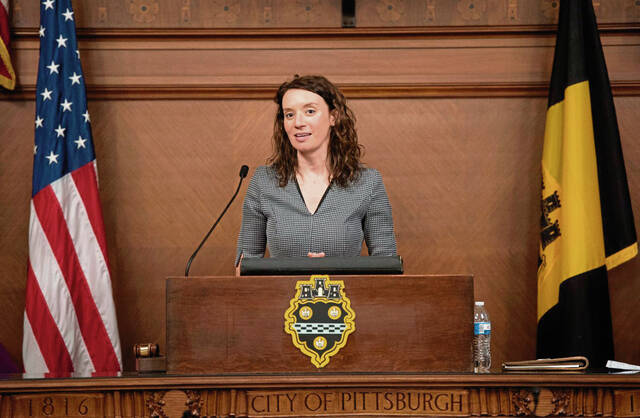https://triblive.com/local/heisler-warns-of-widespread-service-disruptions-if-pittsburgh-fleet-isnt-funded/
Heisler warns of ‘widespread service disruptions’ if Pittsburgh fleet isn’t funded

Pittsburgh Controller Rachael Heisler is urging officials to create a fund for nonprofits to help buy new emergency vehicles as the city struggles to maintain an aging, breakdown-prone fleet.
If Pittsburgh doesn’t significantly bolster investments to the fleet, the city could experience “widespread service disruptions” in the coming years, Heisler warned in a report issued Tuesday.
The report reiterated what many officials have said for years: the city’s beleaguered vehicle fleet — including ambulances, fire trucks and police cars — needs serious upgrades.
Heisler in a statement said the city has long under-invested in that area — and is poised to do so again next year.
She also questioned whether outgoing Mayor Ed Gainey’s 2026 budget proposal includes enough cash for vehicle maintenance, adding to a chorus of concerns from elected officials about whether the spending plan will cover all the city’s expenses.
“This is bad for the city’s financial health, it’s bad for residents’ quality of life, it’s just bad across the board,” Heisler said.
Heisler suggested creating a fund where nonprofits could contribute to buying emergency vehicles.
The recommendation comes after Mayor-elect Corey O’Connor has repeatedly pitched the idea of asking major nonprofits — like the city’s large hospital systems — to pay for ambulances or other vehicles.
The city’s fleet manager last month urged council to find some way to provide a steady, predictable funding stream for the fleet.
Officials have long struggled to convince tax-exempt nonprofits to provide payments in lieu of taxes, or PILOTs. Heisler suggested a dedicated fund to emergency vehicles may appeal to nonprofits, as it would demonstrate a “clear and vital use” for their contributions.
The report said nonprofits operating in the city use EMS and fire services at “high rates” and therefore have a “notable stake” in making sure emergency vehicles work properly.
Seeking more data
Heisler also recommended adding metrics to an annual vehicle fleet report that was recently established.
As of June, Pittsburgh’s fleet included 1,339 vehicles. Heisler’s report indicated 105 of those were decommissioned and being used for parts.
Just under one-third of the fleet is at least 10 years old. About the same number of vehicles are between five and nine years old.
Heisler’s report showed almost half the city’s vehicles “exceed their life cycles.”
Many officials have raised concerns about the state of the public safety fleet, but Heisler’s report showed problems across various departments.
For example, the city needs about 123 snowplows to efficiently respond to a snowstorm, the report said. Last winter, the inventory included only 103 — and 37 of those were out of service for maintenance.
Fleet Manager Firmin Maurice told council members last month that the city needs about $22 million a year to replace decrepit vehicles.
Gainey’s budget proposal for next year allocates just over $10 million for vehicles.
No quick fix
Even once the city buys a vehicle, Heisler pointed out, there’s often a delay before it’s on the street.
Fire trucks and ambulances have lengthy wait times before delivery. The controller’s office estimated a fire truck could take two to four years to arrive after it is purchased.
Heisler also raised concerns that it can be harder to buy parts for older vehicles, which lose resale value as they age and often require more costly maintenance.
One example she cited: three of five Department of Public Works vehicles analyzed for her probe required maintenance costs worth more than their purchase price.
“This report demonstrates what has become more and more clear in recent years — that our city fleet is chronically underfunded, rapidly aging, and undermining public safety and essential services,” Heisler said.
“Our lack of investment in the fleet is actually costing the city more money in the long term, forcing us to keep old vehicles on the road that need more and more expensive maintenance.”
Copyright ©2026— Trib Total Media, LLC (TribLIVE.com)
